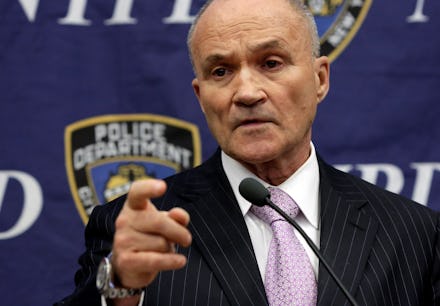Brown University's Ray Kelly Protest Insults Everything the University Stands For

Radical political activists recently swarmed a Brown University lecture hall, interrupting a scheduled lecture by New York City Police Commissioner Ray Kelly. The unruly crowd opposed the Stop and Frisk policies supported by New York's Mayor Bloomberg and implemented by the NYPD under Commissioner Kelly. Administrators promised to allow questions from the rabid group of students following the lecture., but the mob proved to be uninterested in dialogue or civil discourse. Jeering, yelling, chanting, and other thought-repelling tactics continued, creating a hostile environment that prevented Commissioner Kelly from lecturing on “proactive policing in America’s biggest city.”
The students' actions go against the very principles Brown University claims to uphold. And by failing to reprimand the protesters, the university is just as much to blame.
Stop and Frisk allows police officers to stop people if they have a “reasonable suspicion of criminal activity.” The New York Criminal Procedure statute which governs this policy is clearly based on the standard deemed constitutional by the Supreme Court in Terry v. Ohio in 1967.
Due in part to this controversial policy, crime in NYC has plummeted to record lows. To put this in perspective, NYC experienced more than 527,000 violent crimes in 1990; this number plummeted by nearly 80% by 2011, an astounding drop.
Nevertheless, reasonable people do disagree on the implementation of Stop and Frisk in NYC. Opponents argue that a disproportionate number of minorities are affected by the policies. Some opponents believe that police are in fact targeting people based on race and ethnicity. Of course, if any officers are indeed stopping people based on such prejudice, their actions should be condemned, prosecuted, and in no way tolerated. Indeed, the matter of the policy as implemented in NYC is presently being litigated. On Oct. 31, a court ruled that the policy should continue for the time being. Regardless, there well-intentioned people who support and oppose the policy.
The cowardly actions by the protesters at Brown struck at the heart of the democratic spirit. Allowing the exchange of ideas, discussing differences, and communicating shared goals are hallmarks of an orderly democratic process. The college students who short-circuited the process not only did a disservice to Ray Kelly; they also hindered the ability of interested members of the audience to learn. Their inexcusable group temper tantrum tore our social fabric by discouraging other public servants from appearing in public to explain policies, answer criticisms, and gather input directly from citizens. What these students did was unbecoming of Americans, beyond immature, and uncivil.
The refusal of Brown University to expel these students suggests that the administration may no longer be "dedicated to supporting and maintaining a scholarly community in which all share together in the common enterprise of learning." —one of the university's goals, as stated in its academic code. How can Brown University claim to "[promote] intellectual inquiry through vigorous discourse” when radical activists are permitted to stymie this discourse?
The students at Brown University exhibited an utter lack of ability to express themselves coherently, and to engage in the exchange of ideas. Irene Rojas-Carroll, Brown University class of 2015, clearly stated “Our goal was for the lecture to be canceled from the beginning.” Why does this close-minded individual believe she has the right to stop others from learning, from debating, from engaging with others? Is this not a display of tyranny on the campus level?
By all means, those opposed to Stop and Frisk or any other public policy should be permitted to speak out, be engaged, and argue fervently. But this cherished freedom should be extended to the opposing side as well. Universities promote themselves as beacons of academic freedom and intellectual integrity. These students showed disdain for these notions. The lack of response from the Brown University administration is tantamount to acquiescence to this assault.